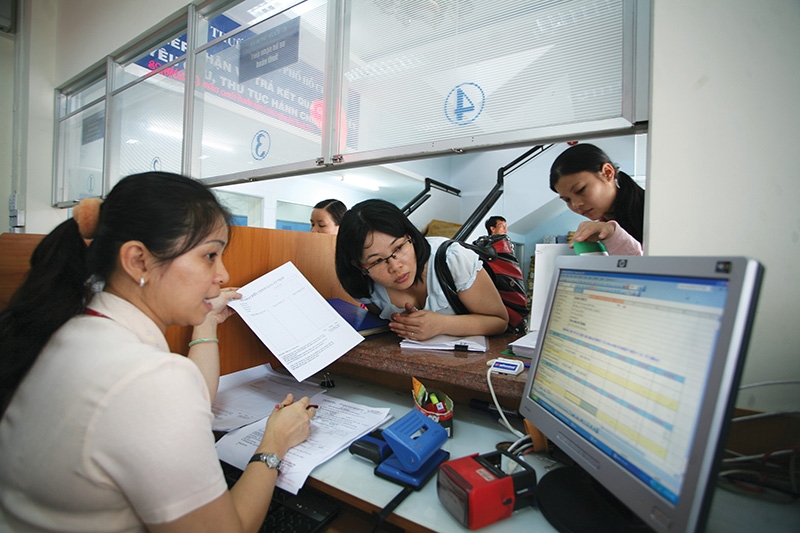Guidance sought in averting tax risks
 |
| The government is extending some tax deadlines for more than 700,000 enterprises, Photo: Le Toan |
Recently, the Vietnamese government has promulgated Decree No.41/2020/ND-CP on extending the deadline for tax and land use fee payments by an additional five months from the original deadline. The nationwide postponement will be made available for more than 700,000 enterprises.
The delay is available for businesses operating in the agro-forestry-fishery, food processing, textile and garment, and construction industries, besides those operating in transportation, warehousing, accommodation and catering, education, and micro- and small-sized enterprises, as well as medical services and parts suppliers.
Subjects eligible for tax extension also include credit institutions and foreign banks in Vietnam that roll out relief measures to alleviate challenges as well as assist distressed customers.
The newly-ratified decree also delays VAT and corporate income tax (CIT) obligations of those working in multiple sectors, one of which is subject to the extension.
According to the Ministry of Finance, the move could provide VND180 trillion ($7.83 billion) in temporary liquidity, giving firms a financial cushion as they cope with the escalating tension of the pandemic. The sum would be collected to the state budget later this year after the public health challenge calms.
Taxpayers must submit a proposal to tax management agencies before July 30 to receive the extension.
However, experts caution that the lack of clear guidance could expose taxpayers to more risks. Firms have to be responsible for their deferral, which also puts them on a razor’s edge: even the policymakers are at odds when determining which taxpayers are eligible for tax extension.
If an enterprise is not found eligible for deferral, tax authorities will issue a written notice and the firm must pay the full amount of tax, rent and late payment interest.
However, given the complex procedures which may stretch out for a long time, businesses are jumping into a great deal of uncertainty – that might very well come around to bite them.
“In some cases, it will take three to five years or retroactive assessment to clarify the legality of a tax deferment to a particular company. In the case that the extension is unfounded and is turned around, the group will be slammed with a huge bill for unpaid taxes, and of course, further penalties,” Nguyen Duc Nghia, chairman of the Ho Chi Minh City Tax Agent Club, warned.
On the other hand, Mai Truong Giang, CEO of Otoke Chicken restaurant, said that it is quite necessary to reduce VAT, CIT, and personal income tax by 50 per cent.
Large chunks of the economy have been frozen as the pandemic caused the closure of malls, restaurants, coffee shops, and factories. This has ensured that the global economy is experiencing “its worst recession since the Great Depression of the 1930s”, according to the International Monetary Fund.
“We are calling upon on the food and beverage (F&B) sector to unite and propose the government the establishment of a nationwide association. If an F&B association representing the entire sector asked government for more relief measures, I believe they would be more forthcoming,” said Giang.
Do Quang Hien, chairman of the Hanoi SME Association suggested, “Authorities should provide more relief such as cutting down on some taxes, not only for now but also for the time ahead in financing production and businesses hit by the outbreak.”
What the stars mean:
★ Poor ★ ★ Promising ★★★ Good ★★★★ Very good ★★★★★ Exceptional
Themes: COVID-19
- 67 million children missed out on vaccines because of Covid: UNICEF
- Vietnam records 305 COVID-19 cases on October 30
- 671 new COVID-19 cases recorded on October 1
- Vietnam logs additional 2,287 COVID-19 cases on Sept. 21
- People’s support decisive to vaccination coverage expansion: official
Related Contents
Latest News
More News
- Foreign leaders extend congratulations to Party General Secretary To Lam (January 25, 2026 | 10:01)
- 14th National Party Congress wraps up with success (January 25, 2026 | 09:49)
- Congratulations from VFF Central Committee's int’l partners to 14th National Party Congress (January 25, 2026 | 09:46)
- 14th Party Central Committee unanimously elects To Lam as General Secretary (January 23, 2026 | 16:22)
- Worldwide congratulations underscore confidence in Vietnam’s 14th Party Congress (January 23, 2026 | 09:02)
- Political parties, organisations, int’l friends send congratulations to 14th National Party Congress (January 22, 2026 | 09:33)
- Press release on second working day of 14th National Party Congress (January 22, 2026 | 09:19)
- 14th National Party Congress: Japanese media highlight Vietnam’s growth targets (January 21, 2026 | 09:46)
- 14th National Party Congress: Driving force for Vietnam to continue renewal, innovation, breakthroughs (January 21, 2026 | 09:42)
- Vietnam remains spiritual support for progressive forces: Colombian party leader (January 21, 2026 | 08:00)

 Tag:
Tag:




















 Mobile Version
Mobile Version